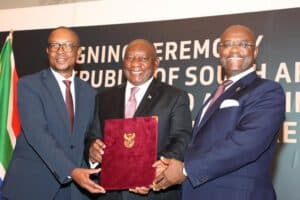The president took the safest and perhaps the only way he knows how to govern: kick for touch, ruffle very few feathers and hope the crisis resolves itself.

At the height of Jacob Zuma’s rule, when President Cyril Ramaphosa was still merely the deputy president of the country, the single biggest criticism he faced was that he never said anything about the huge calamity that was state capture that was unfolding around him.
Upright ministers who dared to stand up to the regime of the day were being fired or sidelined and only those individuals who met the approval of state-capture architects, the now-fugitive Gupta brothers, were appointed or promoted.
Yet Ramaphosa remained quiet. There was some agreement that had he sounded the alarm bells he, too, would have been sidelined and therefore the most strategic thing he could do was keep mum and wait his turn.
He eventually found his voice in the run-up to the 2017 ANC national elective conference at which he was to be elected ANC president for the first time.
What was the very first thing he called for at the height of state capture when he finally found his voice?
“We need to act now to prevent any further damage. We need an independent judicial commission of inquiry… our law enforcement must act with speed and purpose to investigate all these allegations…”
When South Africa faced its biggest crisis post-94, Ramaphosa’s response was to call for a commission of inquiry.
ALSO READ: Ramaphosa’s response to Mkhwanazi falls flat as fatigue for commission of inquiry creeps in
He was only a deputy president then and had limited powers. And now that the country faces its worst crisis besides the Covid pandemic since he took over as president what does he do?
“I am establishing a judicial commission of inquiry to be headed by Acting Deputy Chief Justice Mbuyiseli Madlanga.”
The president took the safest and perhaps the only way he knows how to govern: kick for touch, ruffle very few feathers and hope the crisis resolves itself.
South Africa has had dozens of commissions of inquiry in its recent past.
The one the president called for before he became president was the Commission of Inquiry into State Capture under then deputy chief justice Raymond Zondo.
It was the biggest and most expensive commission this country has yet known. Also, perhaps the biggest waste of taxpayers’ money by any commission based on the results it produced.
There are few cases that it brought forward that ended up in a court of law with consequences for the accused.
ALSO READ: 6 commissions of inquiry government has launched before, and for what
The Daily Maverick estimated that up to R1.5 trillion was lost to state capture over a four-year period. Yet, no convictions are flowing from the Zondo commission.
The president’s response in establishing a commission of inquiry into KwaZulu-Natal police commissioner Nhlanhla Mkhwanazi’s allegations of police leadership corruption up to ministerial level might turn out to be a masterstroke if it works.
But it could also turn out to be as big a waste of money as state capture if it doesn’t. The one thing the president has done successfully thus far is kick the can further down the road, for at least six more months.
“The rot in the police is so deep there is nothing else the president could have done except for a commission of inquiry,” is what some might argue.
Maybe they are right, the president could not just fire a minister without testing Mkhwanazi’s allegations. What if it turns out Mkhwanazi himself is not motivated by pure intentions? None of that matters.
What will matter in the end is whether the findings and recommendations of the inquiry will be treated like those of the Zondo commission.
One thing is clear though, the patience of the population is wearing thin with each passing scandal and one more failed commission might have catastrophic political consequences.
NOW READ: Mchunu backs Ramaphosa’s move to launch inquiry, steps aside ‘with honour’
Support Local Journalism
Add The Citizen as a Preferred Source on Google and follow us on Google News to see more of our trusted reporting in Google News and Top Stories.








